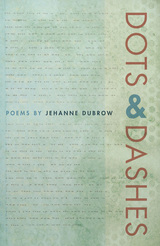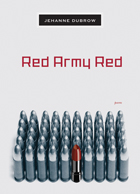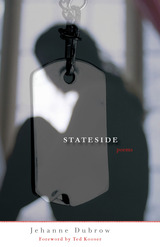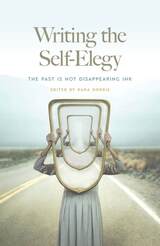
As in the poet’s earlier collection, Stateside, the poems in Dots & Dashes are explicitly feminist, exploring the experiences of women whose husbands are deployed. But, while Stateside looked to masculine stories of war, Dots & Dashes incorporates the views and voices of female poets who have written about combat. Looking to Sappho and Emily Dickinson, the poet considers how the act of writing allows her autonomy and agency rarely granted to military spouses, even in the twenty-first century. Dubrow catalogs the domestic life of a military spouse, illustrating what it is like to live in a tightly constructed world of rules and regulations, ceremony and tradition, where “every sacrifice already / knows its place.”
Navigating the rough seas of marriage alongside questions about how civilians and those in the military can learn to communicate with one another, Dubrow argues for compassion and empathy on both sides. In this timely collection, Dubrow offers the hope that if we can break apart our preconceptions and stereotypes, we can find what connects all of us.


Winner, 2012 Alice Fay Di Castagnola Award from the Poetry Society of America
Winner, Individual Artist's Award from the Maryland State Arts Council
First Prize, Anna Davidson Rosenberg Poetry Award for Poems on the Jewish Experience (for three poems from her manuscript-in-progress, "The Arranged Marriage")
Although the poems in Stateside are concerned with a husband's deployment to the war in Iraq, Jehanne Dubrow's riveting collection is driven more by intellectual curiosity and emotional exploration than by any overt political agenda. The speaker in these poems attempts to understand her situation within the long history of military wives left to wait and wonder – Penelope is a model, but also a source of mystery. These poems are dazzling in their use of form, their sensual imagery, and their learnedness, and possess a level of subtlety and control rarely found in the work of a young poet. Dubrow is fearless in her contemplation of the far-reaching effects of war, but even more so in her excavation of a marriage under duress.

Honest, aching, and intimate, self-elegies are unique poems focusing on loss rather than death, mourning versions of the self that are forgotten or that never existed. Within their lyrical frame, multiple selves can coexist—wise and naïve, angry and resigned—along with multiple timelines, each possible path stemming from one small choice that both creates new selves and negates potential selves. Giving voice to pain while complicating personal truths, self-elegies are an ideal poetic form for our time, compelling us to question our close-minded certainties, heal divides, and rethink our relation to others.
In Writing the Self-Elegy, poet Kara Dorris introduces us to this prismatic tradition and its potential to forge new worlds. The self-elegies she includes in this anthology mix autobiography and poetics, blending craft with race, gender, sexuality, ability and disability, and place—all of the private and public elements that build individual and social identity. These poems reflect our complicated present while connecting us to our past, acting as lenses for understanding, and defining the self while facilitating reinvention. The twenty-eight poets included in this volume each practice self-elegy differently, realizing the full range of the form. In addition to a short essay that encapsulates the core value of the genre and its structural power, each poet’s contribution concludes with writing prompts that will be an inspiration inside the classroom and out. This is an anthology readers will keep close and share, exemplifying a style of writing that is as playful as it is interrogative and that restores the self in its confrontation with grief.
READERS
Browse our collection.
PUBLISHERS
See BiblioVault's publisher services.
STUDENT SERVICES
Files for college accessibility offices.
UChicago Accessibility Resources
home | accessibility | search | about | contact us
BiblioVault ® 2001 - 2024
The University of Chicago Press









